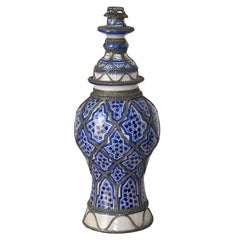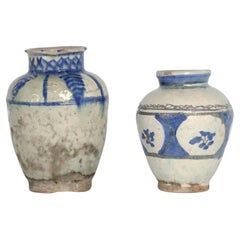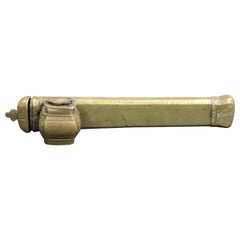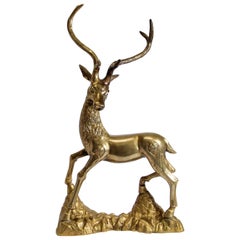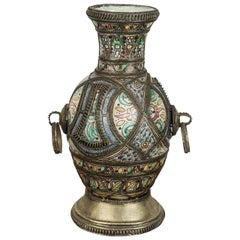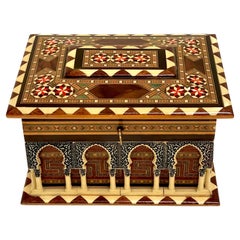Moorish Decorative Objects
After the Muslim conquest of the Iberian Peninsula in the eighth century, Islamic Spain became a cultural mix of influences that shaped both private homes and religious spaces. Moorish design was the name given to this style, which evolved through the 15th century with vibrant tile work, horseshoe arches and lavish ornamentation, most visible at sites such as Granada’s Alhambra and the Mosque-Cathedral of Córdoba. Moorish furniture was often similarly ornate, and featured pieces inlaid with wood, ivory and bone.
When European designers began studying Moorish art and architecture in the early 19th century, it led to a Moorish Revival. Appropriating the style’s decorative flourishes and architectural elements, it promoted a romantic view of Islamic design. Travelers could bring home a memento of what they witnessed in the Middle East, a trend that aligned with a fad for themed interiors. Men’s smoking rooms arranged with ottomans, divans and settees and inlaid tables were especially popular, as were cafés where coffee was served amid bead curtains and colorful floor mats. (Handwoven rugs are a centerpiece of Moorish interiors.) Octagonal rooms with domed ceilings were created for wealthy homes, frequently with furnishings like pipe stands, filigree plasterwork and arched doorways. The horseshoe arch is an iconic attribute of Moorish architecture that, in addition to Spain, can be found in Sicily, Morocco and elsewhere.
Several late 19th to early 20th-century movements featured Moorish touches. The American and English Aesthetic Movement, for example, borrowed liberally from global decorating styles, as seen in furniture designed by Lockwood de Forest, a New York-born artist who mixed Eastern and Western forms. The visual vocabulary of Art Nouveau also references the elegant use of geometry in Moorish design, with Milanese Art Nouveau furniture designer Carlo Bugatti drawing inspiration from the style. The Arts and Crafts movement, which prized expressive yet simple design, incorporated Moorish influences; hand-painted furniture and tile work created by William De Morgan, a British designer and potter who made furnishings for the likes of Morris & Co., were informed by techniques from Moorish Spain.
Find a collection of Moorish lighting, decorative objects, folk art and more furniture on 1stDibs.
Early 20th Century Moroccan Moorish Decorative Objects
Ceramic
Mid-18th Century Persian Antique Moorish Decorative Objects
Terracotta
19th Century Asian Antique Moorish Decorative Objects
Brass
20th Century American Moorish Decorative Objects
Brass
Late 19th Century Moroccan Antique Moorish Decorative Objects
Ceramic
20th Century Spanish Moorish Decorative Objects
Brass
17th Century Spanish Antique Moorish Decorative Objects
Brass, Wrought Iron
Mid-20th Century Moroccan Moorish Decorative Objects
Metal
20th Century Moroccan Moorish Decorative Objects
Brass
Early 20th Century Turkish Moorish Decorative Objects
Stone, Brass
1980s Moroccan Vintage Moorish Decorative Objects
Metal
Mid-20th Century Moroccan Moorish Decorative Objects
Ceramic
19th Century French Antique Moorish Decorative Objects
Bronze
20th Century Moorish Decorative Objects
Ceramic
Early 19th Century Asian Antique Moorish Decorative Objects
Brass
Mid-20th Century Lebanese Moorish Decorative Objects
Abalone, Fruitwood
Mid-20th Century Moroccan Moorish Decorative Objects
Ceramic
Early 20th Century Unknown Moorish Decorative Objects
Metal
Mid-20th Century Spanish Moorish Decorative Objects
Shell, Fruitwood
1970s Moroccan Vintage Moorish Decorative Objects
Brass
20th Century Moroccan Moorish Decorative Objects
Metal
Early 20th Century Moroccan Moorish Decorative Objects
Metallic Thread
1950s Moroccan Vintage Moorish Decorative Objects
Ceramic
Early 20th Century Egyptian Moorish Decorative Objects
Brass
Mid-20th Century Moroccan Moorish Decorative Objects
Metal
Early 20th Century Moroccan Moorish Decorative Objects
Ceramic
19th Century Antique Moorish Decorative Objects
Metal, Copper
19th Century French Antique Moorish Decorative Objects
Bronze
1890s Moroccan Antique Moorish Decorative Objects
Ceramic
20th Century Moorish Decorative Objects
Wood
Mid-19th Century Persian Antique Moorish Decorative Objects
Metal, Brass
1990s Moroccan Moorish Decorative Objects
Ceramic
Mid-20th Century Spanish Moorish Decorative Objects
Fruitwood
Mid-20th Century Moroccan Moorish Decorative Objects
Metal
Mid-20th Century Moroccan Moorish Decorative Objects
Ceramic
20th Century Moroccan Moorish Decorative Objects
Ceramic
1910s Austrian Vintage Moorish Decorative Objects
Bronze
1940s Moroccan Vintage Moorish Decorative Objects
Ceramic
19th Century Indian Antique Moorish Decorative Objects
Brass
20th Century Italian Moorish Decorative Objects
Ceramic, Paint
Late 19th Century Moroccan Antique Moorish Decorative Objects
Metallic Thread
19th Century Indian Antique Moorish Decorative Objects
Brass
19th Century French Antique Moorish Decorative Objects
Spelter
Early 20th Century Moorish Decorative Objects
Fruitwood
Late 19th Century French Antique Moorish Decorative Objects
Bronze
1910s Moroccan Vintage Moorish Decorative Objects
Bronze
Mid-19th Century Asian Antique Moorish Decorative Objects
Copper
Early 20th Century Austrian Moorish Decorative Objects
Bronze
20th Century Moroccan Moorish Decorative Objects
Metal
Late 19th Century Indian Antique Moorish Decorative Objects
Bronze
Early 20th Century Moroccan Moorish Decorative Objects
Ceramic
Mid-20th Century Moroccan Moorish Decorative Objects
Ceramic
Mid-20th Century Lebanese Moorish Decorative Objects
Shell, Fruitwood, Abalone
20th Century Moroccan Moorish Decorative Objects
Metal
Mid-20th Century Moroccan Moorish Decorative Objects
Ceramic
Late 19th Century French Antique Moorish Decorative Objects
Spelter
1890s Austrian Antique Moorish Decorative Objects
Crystal, Bronze
19th Century Antique Moorish Decorative Objects
Brass
20th Century Turkish Moorish Decorative Objects
Copper
Early 20th Century Moroccan Moorish Decorative Objects
Metal, Nickel
